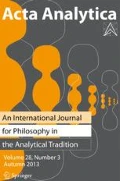Abstract
The paper defends causal explanationism concerning our modal intuitions and judgments, and, in particular, the following claims. If a causally explainable mirroring or “pre-established harmony” between our mind and modal reality obtains, we are justified in believing it does. We do not hold our modal beliefs compulsively and blindly but with full subjective and objective justification. Therefore, causal explanation of our modal beliefs does not undermine rational trust in them. Explanation and trust support each other. In contrast, anti-explanationists (from Kant, through neo-wittgensteinians to T. Nagel and J. Pust), claim that causal explanation of intuitions and judgments undermines rational trust in them. They especially target causal explanation in terms of pre-established harmony between our mind, shaped by causal processes, and the underlying modal structure of reality. The paper argues against them. The argument builds upon the claim that the appeal to modal facts is indispensable for systematization and explanation of non-modal ones. Therefore, we should assume that modal facts exist and are not disjoint and isolated from actual facts. The modal structure of the universe intervenes in the non-modal reality. Causal processes indirectly carry information about deep modal structure. Any (reasonable candidate) causal explanation of our intuitional modal beliefs should start from this indirect contact with and information about modal facts. Therefore, if our intuitional modal beliefs are true and causally explainable (by a factual, non-modal explanans), they are true in virtue of the deep underlying modal structure. They are sensitive to modal reality and track it. We can come to know this fact, and thus strengthen our spontaneous trust in our modal intuitions.
Similar content being viewed by others
References
Adams, J.M. (1983), “Divine Necessity”, The Journal of Philosophy, v. 80, 741–752.
Bealer, G. (1999), “A Theory of the A Priori”, in Philosophical Perspectives, No. 13, Epistemology, Blackwell, Oxford.
Bealer, G. (1987), “The Philosophical Limits of Scientific Essentialism”, Philosophical Perspectives 1, 289–365.
Elder, C. (1992), “An Epistemological Defense of Realism about Necessity”, Philosophical Quarterly, 42, 317–336.
Elder, C. (1999), “Ontology and Realism About Modality”, Australasian Journal of Philosophy, v. 77/3, 292–302.
Kant, I., Critique of Pure Reason, N. Kemp Smith transl.
Lear, J. (1984), “The Disappearing ‘We’”, PAS, Suppl. V, LVIII, 219–242.
Menzies, P. (1993), “Modality and Response-Dependence”, Working Papers in Philosophy, ANU.
Heathcote, A (MS), “Yes, but what is the mother of necessity?”, electronic text available at author’s web-site.
Ladyman, J. (2000), “What’s Really Wrong With Constructive Empiricism? Van Fraassen and the Metaphysics of Modality”, British J. for the Philosophy of Science, v. 51, 837–856.
Nagel. T. (1997), The Last Word, Oxford U. P., Oxford.
Peacocke, C. (1999), Being Known, Clarendon Press, Oxford.
Peacocke, C. (2002), “Précis of Being Known”, Philosophy And Phenomenological Research, v. LXIV, No. 3, 636–9.
Pust J. (2000), Intuitions as evidence, Garland Publishing Inc., London and New York.
Sorensen, R.A. (1992), “Thought Experiments and the Epistemology of Laws”, Canadian Journal of philosophy, No. 1, pp. 15–44.
Sosa, E. (1991), Knowledge in Perspective, Cambridge University Press, Cambridge.
Stroud, B. (2000), Understanding Human Knowledge, Oxford University Press, Oxford.
Wright, C. (1980), Wittgenstein on the Foundations of Mathematics, Duckworth, London.
Wright, C. (1986), “Inventing Logical Necessity”, in Butterfield, J. (ed.), Language, Mind and Logic, Cambridge University Press, Cambridge, England.
Wright, C. (1989), “Necessity, Caution and Scepticism”, Proceedings of the Aristotelian Society, v. 63.
Wright, C. (1992), Truth and Objectivity, Harvard University Press, Harvard, Mass.
Author information
Authors and Affiliations
Rights and permissions
About this article
Cite this article
Miščević, N. Explaining modal intuition. Acta Anal 18, 5–41 (2003). https://doi.org/10.1007/s12136-003-1013-0
Received:
Issue Date:
DOI: https://doi.org/10.1007/s12136-003-1013-0


